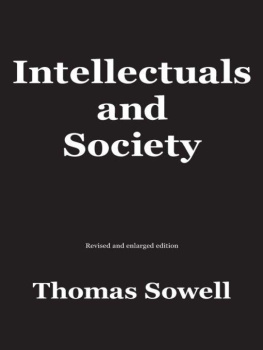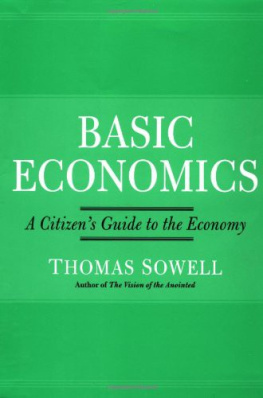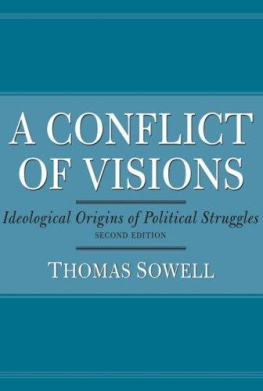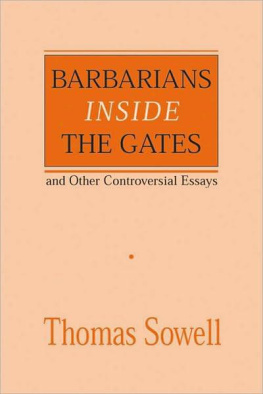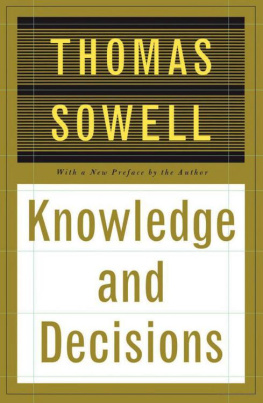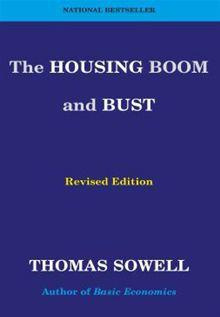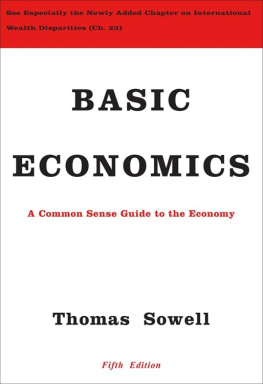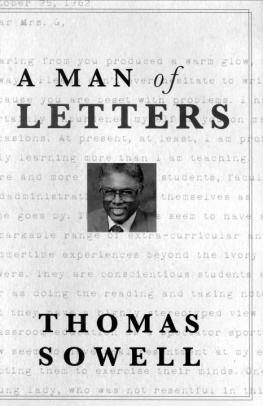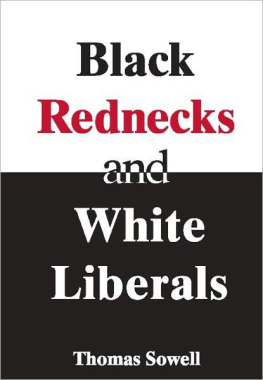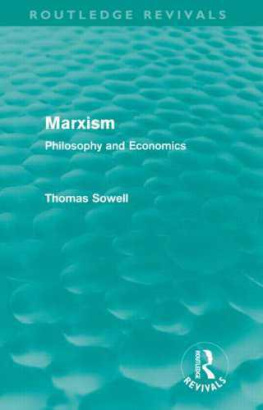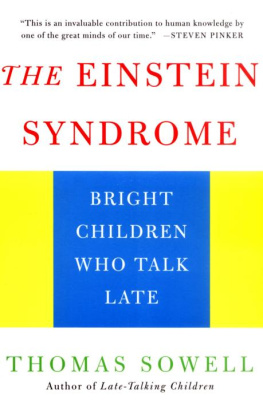Thomas Sowell - Marxism
Here you can read online Thomas Sowell - Marxism full text of the book (entire story) in english for free. Download pdf and epub, get meaning, cover and reviews about this ebook. year: 2011, genre: Religion. Description of the work, (preface) as well as reviews are available. Best literature library LitArk.com created for fans of good reading and offers a wide selection of genres:
Romance novel
Science fiction
Adventure
Detective
Science
History
Home and family
Prose
Art
Politics
Computer
Non-fiction
Religion
Business
Children
Humor
Choose a favorite category and find really read worthwhile books. Enjoy immersion in the world of imagination, feel the emotions of the characters or learn something new for yourself, make an fascinating discovery.
- Book:Marxism
- Author:
- Genre:
- Year:2011
- Rating:3 / 5
- Favourites:Add to favourites
- Your mark:
- 60
- 1
- 2
- 3
- 4
- 5
Marxism: summary, description and annotation
We offer to read an annotation, description, summary or preface (depends on what the author of the book "Marxism" wrote himself). If you haven't found the necessary information about the book — write in the comments, we will try to find it.
Marxism — read online for free the complete book (whole text) full work
Below is the text of the book, divided by pages. System saving the place of the last page read, allows you to conveniently read the book "Marxism" online for free, without having to search again every time where you left off. Put a bookmark, and you can go to the page where you finished reading at any time.
Font size:
Interval:
Bookmark:
This slim volume distills more than a quarter of a century of research and thought on the economic and philosophic doctrines of Karl Marx. Over this long span of time, it has been possible to separate the essential from the non-essential in the theories of Marx and Engels, and thus to say in a small book what would otherwise take several volumes. The most non-essentialindeed, intellectually counterproductiveaspect of Marxism has been the elaborate jargon and stylized rhetoric in which its substance has been discussed, especially by followers and interpreters. Marxists, non-Marxists, and anti-Marxists alike have become bogged down in turgid words, when the real subject is "the blaze of ideas," to use Marx's own phrase.[1]
Wherever possible, I have quoted the original words of Marx and Engels. But passage-quoting is not enough. For Marxian writings that fill many volumes and span several decades of changing circumstances and evolving doctrines, context is crucial. Interpretation is a demanding responsibility that cannot be discharged merely by stringing quotes together. However, it is not necessary to believe the doctrine that one can "prove anything" by lifting quotes from Marx. On the contrary. Much recent interpretive literature, especially in economics, inadvertently demonstrates that various interpretations of Marx cannot be supported by quotes from his writings. even articles in learned journals and scholarly books have solemnly and extensively analyzed particular "Marxian" doctrines without a single citation of anything ever written by Karl Marx. Often this "Marxism" bears no relationship to the work of Marx or Engels. In this way, particular doctrines and whole systems have emerged that might more accurately be called Samuelson-"Marxism" or Sweezy-"Marxism," etc. These modern concoctions have acquired a life of their own through sheer repetition, citation, and inertia.
While this book will not spend much space on refuting the secondary literature, there will be points at which the original Marxian analysis and doctrines will be contrasted with more recent fabrications bearing similar labels. Because the main purpose of this book is interpretation, its critical evaluation of Marxism will be saved until the last chapter.
A stylistic note may be in order. Because of Marx's penchant for italicized words, it should be noted here that all emphases are in the original, unless specifically stated otherwise.
My own philosophic, economic, and political orientations have ranged widely across the spectrum from the time of my undergraduate honors thesis on Marx at Harvard in 1958, through various articles on Marx in scholarly journals in the United States, Britain, and Canada during the 1960s, to the present work. What is gratifying is to be able to read back over these earlier efforts and see how little difference my own changing viewpoints have made in the purely interpretive analysis.
Compared to my earlier writings on Marx, the present book draws on additional knowledge, later scholarship by others, newly unearthed facts and more recently translated worksnotably Marx's Grundrisse . But this has largely meant putting flesh and blood on a skeleton that has not changed essentially in form. What has become possible today is a more three-dimensional look at one of the most intellectually and morally challenging visions of the modern era, and one which this and succeeding generations will have to confront in one way or another.
Thomas Sowell
The Hoover Institution
September 3, 1982
Philosophy and economics were not simply separate interests of Karl Marx. His philosophy provided the intellectual framework and the very language in which Marx discussed economics. That language must be understood in order to understand Marxian economics, regardless of whether or not the economic substance is logically independent. The philosophy is also important in itself as the driving force behind a vision that has come to dominate a major part of the globe and of the human species.
Marxian philosophy and economics derive from many sources, as well as bearing the unique imprint of Karl Marx and his lifelong friend and collaborator, Frederich Engels. The towering figure of G.W.F. Hegel stands out among the philosophers influencing Marx's thought, but other elements of his philosophy go as far back as Democritus, Epicurus and Lucretius in ancient times, Helvetius and Holbach in the eighteenth century, and Feuerbach among the contemporaries of the young Marx. In economics, the analysis and terminology of David Ricardo provide much of the background for Marx's Capital , but the intellectual predecessor of both men was Adam Smith, patron saint of laissez-faire capitalism.
A sharp distinction must be made between saying that the form of Marxian thought was shaped by some predecessor and saying that the substance was similar. The difference may be illustrated by comparing Hegel's description of a certain period of history with Marx's description, which was quite similar in form, but utterly different in content.
First Hegel:
These three eventsthe so-called Revival of Learning, the flourishing of the fine Arts and the discovery of America and of the passage to India by the Capemay be compared with that blush of dawn , which after long storms first betokens the return of a bright and glorious day.[2]
Then Marx:
The discovery of gold and silver in America, the extirpation, enslavement and entombment in mines of the aboriginal population, the beginning of the conquest and looting of the East Indies, the turning of Africa into a warren for the commercial hunting of black-skins, signalized the rosy dawn of the era of capitalist production.[3]
Marx was quite open and frank in declaring himself "the pupil of that mighty thinker," Hegel, and deliberately used "the modes of expression particular to him," in writing Capital .[4] But he also sharply distinguished "the method of presentation" from the substantive inquiry.[5] To say that Hegelianism was the language in which Marx expressed many concepts is not to say that Marx's substantive statements repeat Hegel. It does say, however, that understanding the peculiar language and intellectual framework of a Hegel or a Ricardo is necessary for understanding the economics of Marx. As the distinguished economist J.A. Schumpeter once observed: "This is all the more important because the necessity for it does not show on the surface." That is, words like "alienation" or "contradiction" (from Hegel) or "wages" and "value" (from Ricardo) can be taken in their ordinary senses and Marx interpreted coherentlybut incorrectly, and completely missing the point of his arguments. Marx's business cycle theory, for example, has been grossly misunderstood by interpreters who have seized upon the word "contradiction" in its ordinary (non-Hegelian) sense. Marx's predictions about wage levels under capitalism have likewise been greatly distorted by interpreters unfamiliar with the peculiar Ricardian concepts of "rises" and "falls" in wages.
Marxism is not inherently difficult to understand, in either its philosophic or economic aspects. It has, however, been made difficult by a number of circumstances. One was Marx's method of presentation, especially in his massive classic, Capital . Other sources of difficulty are the numerous and diverse interpretations by writers who ahve no troubled themselves to study the philosophic and economic framework of Marx's ideas. Schumpeter listed a formidable set of prerequisites for studying Marx[6]and these can also be read as a list of reasons why so few interpreters have understood Marxism. Much of the modern economic literature, for example, sidesteps the whole problem of interpretation by taking what is commonly believed about Marxian economics as a starting point, and then elaborately analyzes and critiques the implications of these "Marxian" doctrinesoften without a single reference to anything actually written by Karl Marx.[7]
Font size:
Interval:
Bookmark:
Similar books «Marxism»
Look at similar books to Marxism. We have selected literature similar in name and meaning in the hope of providing readers with more options to find new, interesting, not yet read works.
Discussion, reviews of the book Marxism and just readers' own opinions. Leave your comments, write what you think about the work, its meaning or the main characters. Specify what exactly you liked and what you didn't like, and why you think so.


